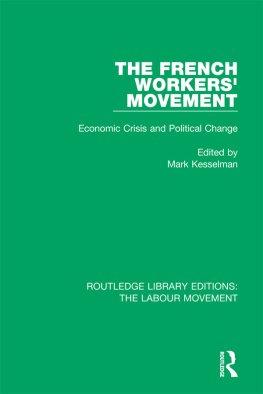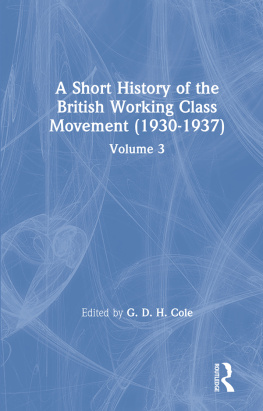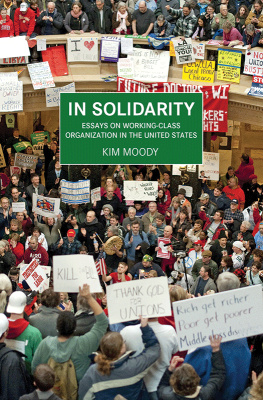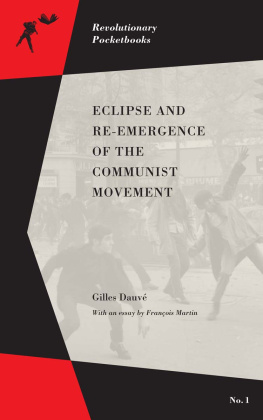First published in 1984 by George Allen & Unwin Ltd
This edition first published in 2019
by Routledge
2 Park Square, Milton Park, Abingdon, Oxon OX14 4RN
and by Routledge
711 Third Avenue, New York, NY 10017
Routledge is an imprint of the Taylor & Francis Group, an informa business
1984 Mark Kesselman
All rights reserved. No part of this book may be reprinted or reproduced or utilised in any form or by any electronic, mechanical, or other means, now known or hereafter invented, including photocopying and recording, or in any information storage or retrieval system, without permission in writing from the publishers.
Trademark notice: Product or corporate names may be trademarks or registered trademarks, and are used only for identification and explanation without intent to infringe.
British Library Cataloguing in Publication Data
A catalogue record for this book is available from the British Library
ISBN: 978-1-138-32435-0 (Set)
ISBN: 978-0-429-43443-3 (Set) (ebk)
ISBN: 978-1-138-32537-1 (Volume 21) (hbk)
ISBN: 978-0-429-45041-9 (Volume 21) (ebk)
Publishers Note
The publisher has gone to great lengths to ensure the quality of this reprint but points out that some imperfections in the original copies may be apparent.
Disclaimer
The publisher has made every effort to trace copyright holders and would welcome correspondence from those they have been unable to trace.
The French Workers Movement: Economic Crisis and Political Change
Edited by
Mark Kesselman
with the assistance of
Guy Groux
Translated by
Edouardo Diaz, Arthur Goldhammer, and Richard Shryock
London
GEORGE ALLEN & UNWIN
Boston Sydney
Mark Kesselman, 1984.
This book is copyright under the Berne Convention. No reproduction without permission. All rights reserved.
George Allen & Unwin (Publishers) Ltd,
40 Museum Street, London WC1A 1LU, UK
George Allen & Unwin (Publishers) Ltd,
Park Lane, Hemel Hempstead, Herts HP2 4TE, UK
Allen & Unwin, Inc.,
9 Winchester Terrace, Winchester, Mass. 01890, USA
George Allen & Unwin Australia Pty Ltd,
8 Napier Street, North Sydney, NSW 2060, Australia
First published in 1984.
British Library Cataloguing in Publication Data
Kesselman, Mark
The French workers movement.
1. Labor and laboring classesFrancePolitical activityHistory20th century
I. Title II. Groux, Guy
33520944 HD8435
ISBN 0-043-31095-8
Library of Congress Cataloging in Publication Data
Main entry under title:
The French workers movement.
Bibliography: p.
Includes index.
1. Trade-unionsFranceAddresses, essays, lectures.
2. FranceEconomic conditions1945 Addresses, essays, lectures.
I. Kesselman, Mark. II. Groux, Guy.
HD6684.F74 1984 331.880944 84-9238
ISBN 0-04-331095-8 (alk. paper)
Set in 10 on 11 point Times by
Mathematical Composition Setters Ltd, Salisbury, UK
and printed in Great Britain by Butler & Tanner Ltd, Frome and London
Preface
This volume aims to describe and analyze the French labor movement during the critically important period of the past decade. During this conjuncture French trade unions were confronted by unusually serious challenges and unusually attractive opportunities. Have trade unions succeeded in developing new organizational capacity and vision adequate to this situation? To what extent have they represented the new segments of the working class and the new demands and issues emerging at this time?
North American and British scholars have closely scrutinized French political parties and elections, as evidenced by the numerous books and articles available on the topic in English. They have paid far less attention to the French labor movement. For example, the last comprehensive surveys in English of French trade unions (Ehrmann, 1947; Lorwin, 1954) were published thirty years ago! While French scholarsmany of whom are among the contributors to the present workhave studied the labor movement, their research is not generally available in English.
This volume seeks to analyze the background and complexities of the situation created by the lefts victory in 1981. Although the contributors diverge on many points, most agree that the gap has increased between the labor movements innovations in the realm of ideology and practice. While unions have forged daring new programmatic approaches, they have been less successful in developing appropriate new forms of struggle which adequately reflect their ideological adaptations. Furthermore, labors strength remains sapped by severe conflicts among rival trade unions.
This volume indirectly suggests why the left government elected in 1981 was unable to develop a cohesive, secure social base. As many of the essays which follow indicate, however, the economic and political situation in France is too complex to permit definitive judgment, either about the significance of the left government or the impact or future evolution of the labor movement. How difficult prediction is can be seen from the fact that planning for this volume began in 1980, when the prospects seemed dim for political change in France. And yet the election of a left government in a period of international economic recession has not proved an unmixed blessing for French labor.
We have incurred many debts in preparing this work. Bernard Moss and Ren Mouriaux were helpful at the early stages in clarifying the overall organization of the volume. Richard Shryock provided invaluable editorial assistance, in addition to helping translate French texts. He also compiled the Bibliography. We are grateful for secretarial help from Aurelia Enache and the Institute on Western Europe, Columbia University; and the Laboratoire de Sociologie du Travail et des Relations Professionnelles, Conservatoire National des Arts et Mtiers. Mark Kesselman wishes to acknowledge financial support provided by a Rockefeller Foundation Humanities Fellowship, which enabled him to organize the volume while in France.
| December 1983 | MARK KESSELMAN |
| GUY GROUX |










